THE AUDITING AND ASSURANCE
VerifiedAdded on 2022/09/05
|7
|1409
|22
AI Summary
Contribute Materials
Your contribution can guide someone’s learning journey. Share your
documents today.
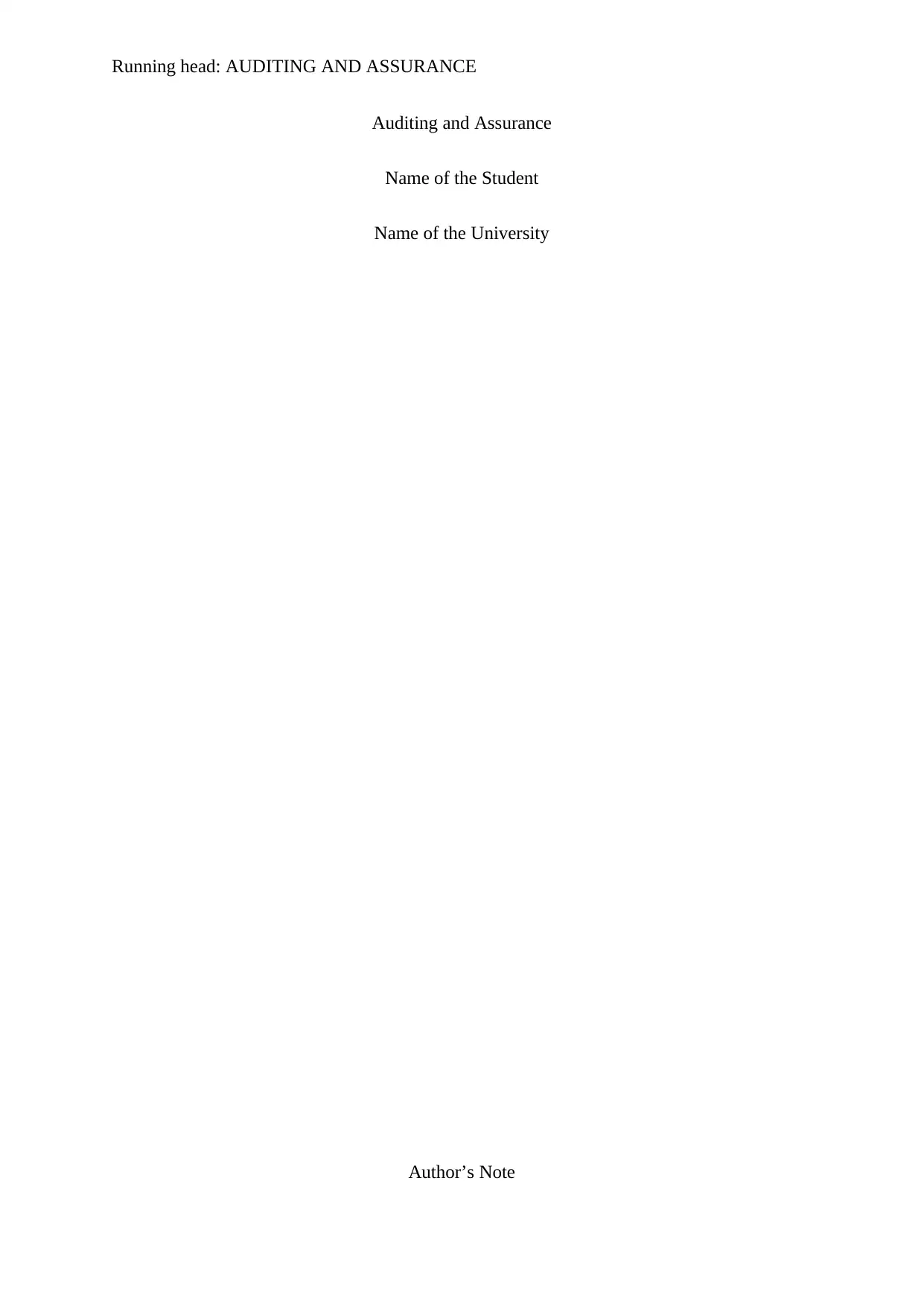
Running head: AUDITING AND ASSURANCE
Auditing and Assurance
Name of the Student
Name of the University
Author’s Note
Auditing and Assurance
Name of the Student
Name of the University
Author’s Note
Secure Best Marks with AI Grader
Need help grading? Try our AI Grader for instant feedback on your assignments.
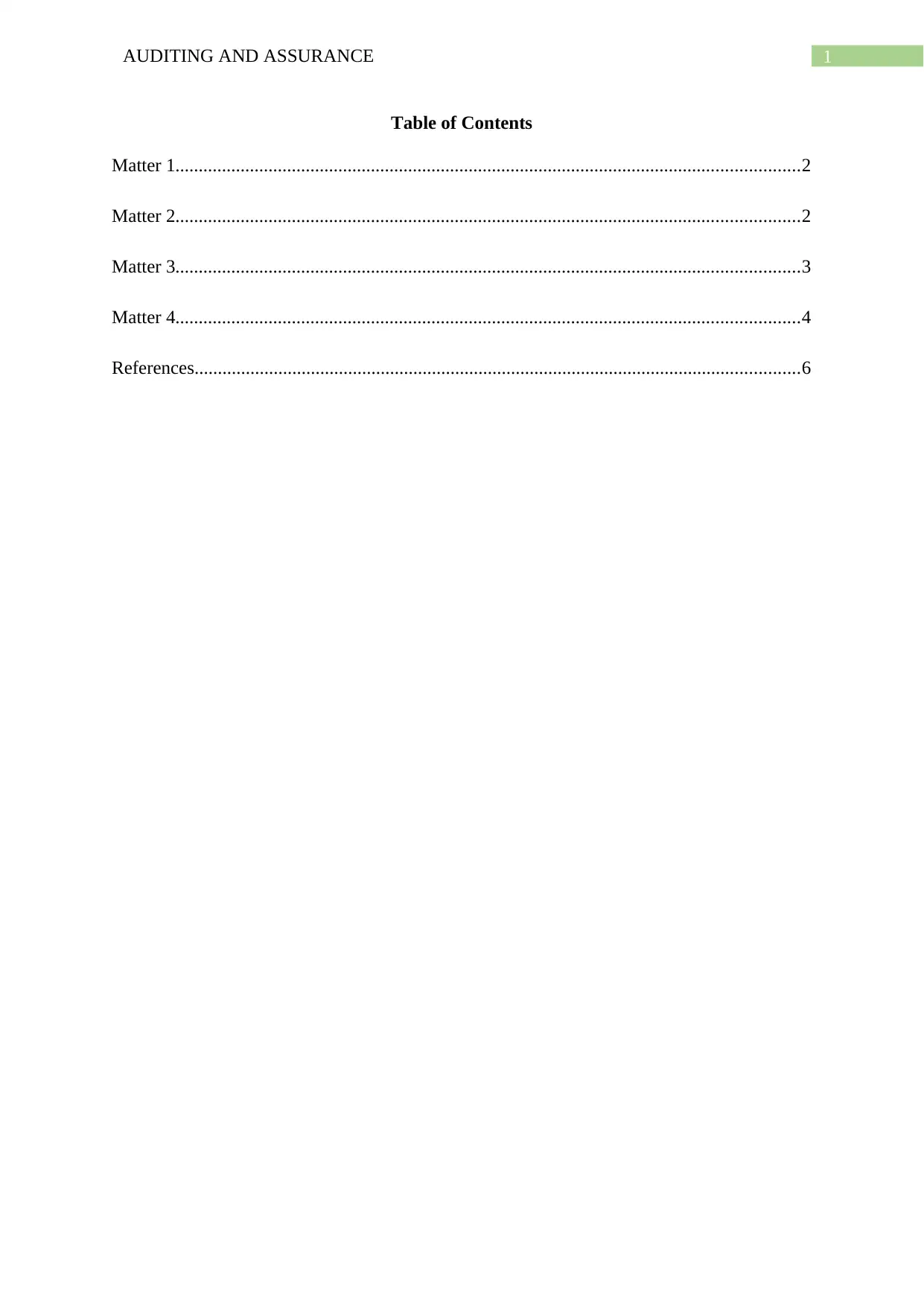
1AUDITING AND ASSURANCE
Table of Contents
Matter 1......................................................................................................................................2
Matter 2......................................................................................................................................2
Matter 3......................................................................................................................................3
Matter 4......................................................................................................................................4
References..................................................................................................................................6
Table of Contents
Matter 1......................................................................................................................................2
Matter 2......................................................................................................................................2
Matter 3......................................................................................................................................3
Matter 4......................................................................................................................................4
References..................................................................................................................................6
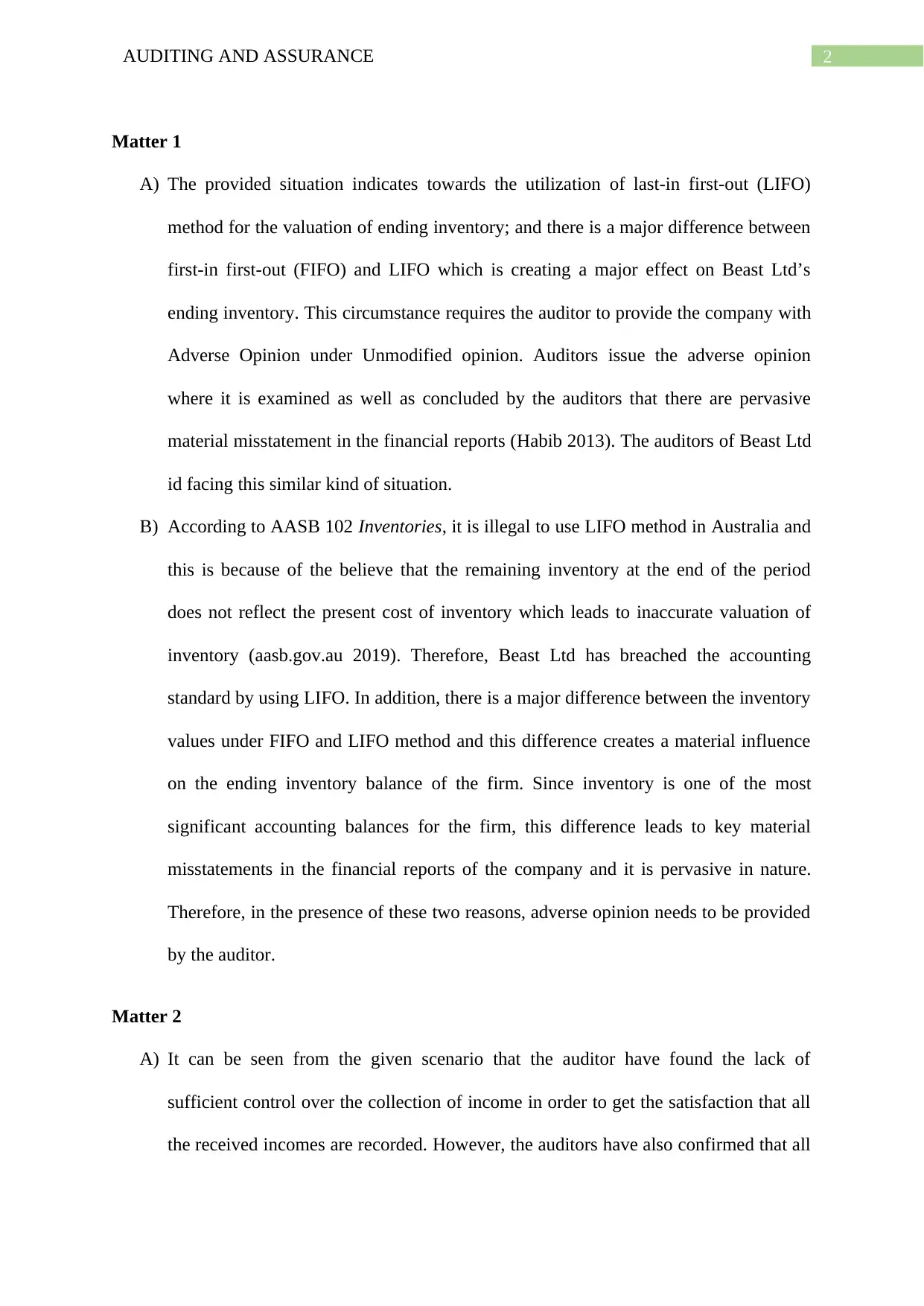
2AUDITING AND ASSURANCE
Matter 1
A) The provided situation indicates towards the utilization of last-in first-out (LIFO)
method for the valuation of ending inventory; and there is a major difference between
first-in first-out (FIFO) and LIFO which is creating a major effect on Beast Ltd’s
ending inventory. This circumstance requires the auditor to provide the company with
Adverse Opinion under Unmodified opinion. Auditors issue the adverse opinion
where it is examined as well as concluded by the auditors that there are pervasive
material misstatement in the financial reports (Habib 2013). The auditors of Beast Ltd
id facing this similar kind of situation.
B) According to AASB 102 Inventories, it is illegal to use LIFO method in Australia and
this is because of the believe that the remaining inventory at the end of the period
does not reflect the present cost of inventory which leads to inaccurate valuation of
inventory (aasb.gov.au 2019). Therefore, Beast Ltd has breached the accounting
standard by using LIFO. In addition, there is a major difference between the inventory
values under FIFO and LIFO method and this difference creates a material influence
on the ending inventory balance of the firm. Since inventory is one of the most
significant accounting balances for the firm, this difference leads to key material
misstatements in the financial reports of the company and it is pervasive in nature.
Therefore, in the presence of these two reasons, adverse opinion needs to be provided
by the auditor.
Matter 2
A) It can be seen from the given scenario that the auditor have found the lack of
sufficient control over the collection of income in order to get the satisfaction that all
the received incomes are recorded. However, the auditors have also confirmed that all
Matter 1
A) The provided situation indicates towards the utilization of last-in first-out (LIFO)
method for the valuation of ending inventory; and there is a major difference between
first-in first-out (FIFO) and LIFO which is creating a major effect on Beast Ltd’s
ending inventory. This circumstance requires the auditor to provide the company with
Adverse Opinion under Unmodified opinion. Auditors issue the adverse opinion
where it is examined as well as concluded by the auditors that there are pervasive
material misstatement in the financial reports (Habib 2013). The auditors of Beast Ltd
id facing this similar kind of situation.
B) According to AASB 102 Inventories, it is illegal to use LIFO method in Australia and
this is because of the believe that the remaining inventory at the end of the period
does not reflect the present cost of inventory which leads to inaccurate valuation of
inventory (aasb.gov.au 2019). Therefore, Beast Ltd has breached the accounting
standard by using LIFO. In addition, there is a major difference between the inventory
values under FIFO and LIFO method and this difference creates a material influence
on the ending inventory balance of the firm. Since inventory is one of the most
significant accounting balances for the firm, this difference leads to key material
misstatements in the financial reports of the company and it is pervasive in nature.
Therefore, in the presence of these two reasons, adverse opinion needs to be provided
by the auditor.
Matter 2
A) It can be seen from the given scenario that the auditor have found the lack of
sufficient control over the collection of income in order to get the satisfaction that all
the received incomes are recorded. However, the auditors have also confirmed that all
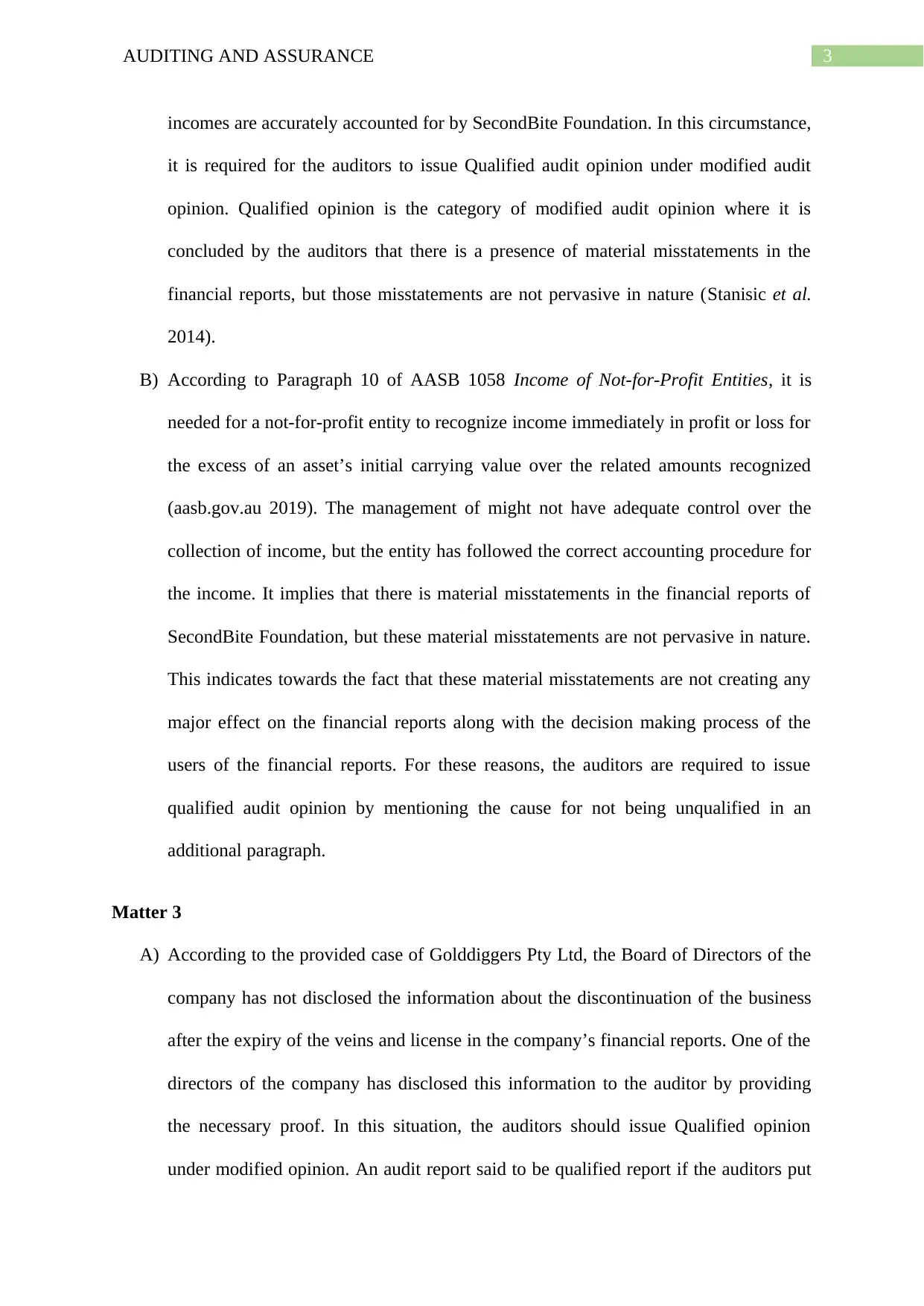
3AUDITING AND ASSURANCE
incomes are accurately accounted for by SecondBite Foundation. In this circumstance,
it is required for the auditors to issue Qualified audit opinion under modified audit
opinion. Qualified opinion is the category of modified audit opinion where it is
concluded by the auditors that there is a presence of material misstatements in the
financial reports, but those misstatements are not pervasive in nature (Stanisic et al.
2014).
B) According to Paragraph 10 of AASB 1058 Income of Not-for-Profit Entities, it is
needed for a not-for-profit entity to recognize income immediately in profit or loss for
the excess of an asset’s initial carrying value over the related amounts recognized
(aasb.gov.au 2019). The management of might not have adequate control over the
collection of income, but the entity has followed the correct accounting procedure for
the income. It implies that there is material misstatements in the financial reports of
SecondBite Foundation, but these material misstatements are not pervasive in nature.
This indicates towards the fact that these material misstatements are not creating any
major effect on the financial reports along with the decision making process of the
users of the financial reports. For these reasons, the auditors are required to issue
qualified audit opinion by mentioning the cause for not being unqualified in an
additional paragraph.
Matter 3
A) According to the provided case of Golddiggers Pty Ltd, the Board of Directors of the
company has not disclosed the information about the discontinuation of the business
after the expiry of the veins and license in the company’s financial reports. One of the
directors of the company has disclosed this information to the auditor by providing
the necessary proof. In this situation, the auditors should issue Qualified opinion
under modified opinion. An audit report said to be qualified report if the auditors put
incomes are accurately accounted for by SecondBite Foundation. In this circumstance,
it is required for the auditors to issue Qualified audit opinion under modified audit
opinion. Qualified opinion is the category of modified audit opinion where it is
concluded by the auditors that there is a presence of material misstatements in the
financial reports, but those misstatements are not pervasive in nature (Stanisic et al.
2014).
B) According to Paragraph 10 of AASB 1058 Income of Not-for-Profit Entities, it is
needed for a not-for-profit entity to recognize income immediately in profit or loss for
the excess of an asset’s initial carrying value over the related amounts recognized
(aasb.gov.au 2019). The management of might not have adequate control over the
collection of income, but the entity has followed the correct accounting procedure for
the income. It implies that there is material misstatements in the financial reports of
SecondBite Foundation, but these material misstatements are not pervasive in nature.
This indicates towards the fact that these material misstatements are not creating any
major effect on the financial reports along with the decision making process of the
users of the financial reports. For these reasons, the auditors are required to issue
qualified audit opinion by mentioning the cause for not being unqualified in an
additional paragraph.
Matter 3
A) According to the provided case of Golddiggers Pty Ltd, the Board of Directors of the
company has not disclosed the information about the discontinuation of the business
after the expiry of the veins and license in the company’s financial reports. One of the
directors of the company has disclosed this information to the auditor by providing
the necessary proof. In this situation, the auditors should issue Qualified opinion
under modified opinion. An audit report said to be qualified report if the auditors put
Secure Best Marks with AI Grader
Need help grading? Try our AI Grader for instant feedback on your assignments.
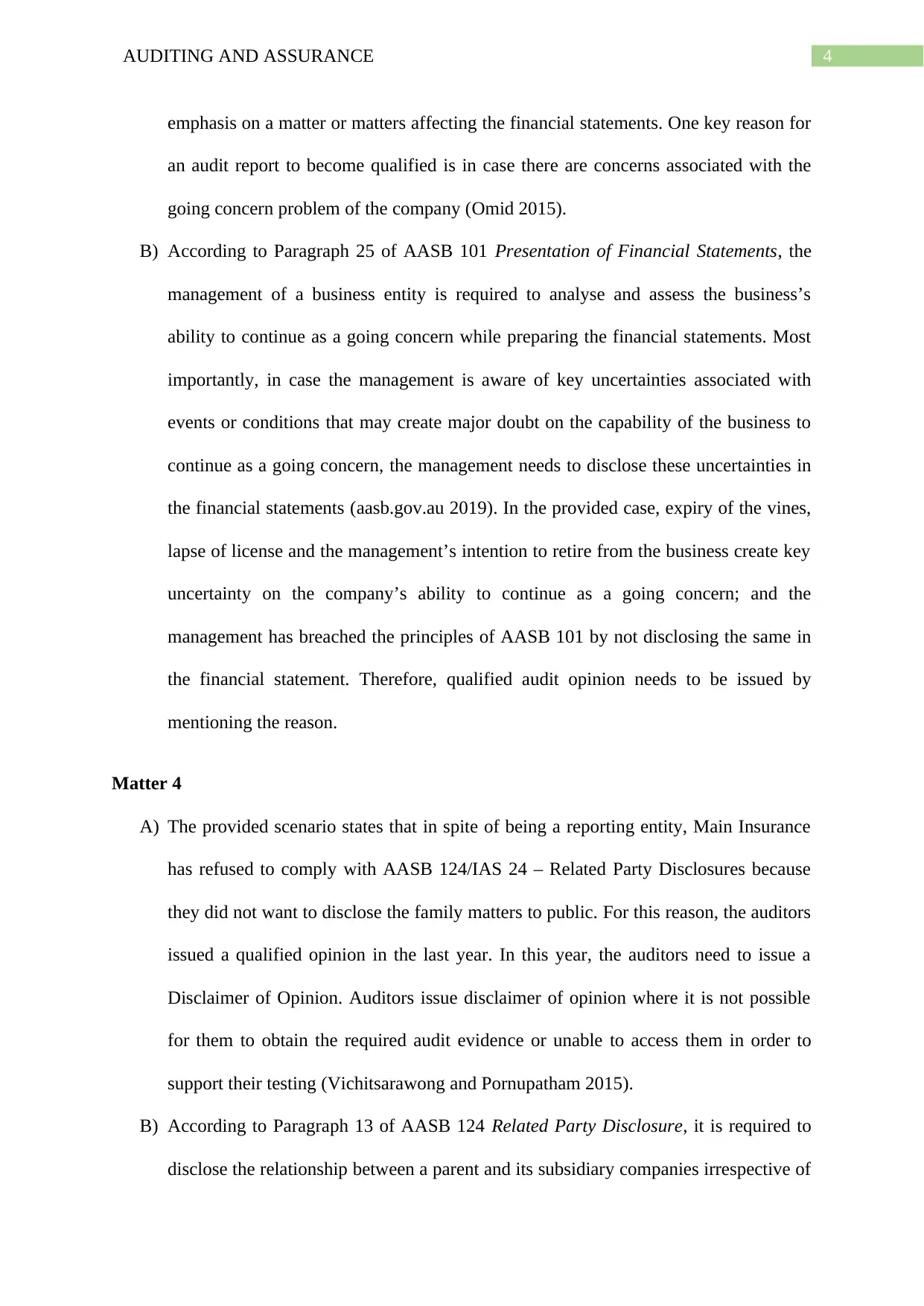
4AUDITING AND ASSURANCE
emphasis on a matter or matters affecting the financial statements. One key reason for
an audit report to become qualified is in case there are concerns associated with the
going concern problem of the company (Omid 2015).
B) According to Paragraph 25 of AASB 101 Presentation of Financial Statements, the
management of a business entity is required to analyse and assess the business’s
ability to continue as a going concern while preparing the financial statements. Most
importantly, in case the management is aware of key uncertainties associated with
events or conditions that may create major doubt on the capability of the business to
continue as a going concern, the management needs to disclose these uncertainties in
the financial statements (aasb.gov.au 2019). In the provided case, expiry of the vines,
lapse of license and the management’s intention to retire from the business create key
uncertainty on the company’s ability to continue as a going concern; and the
management has breached the principles of AASB 101 by not disclosing the same in
the financial statement. Therefore, qualified audit opinion needs to be issued by
mentioning the reason.
Matter 4
A) The provided scenario states that in spite of being a reporting entity, Main Insurance
has refused to comply with AASB 124/IAS 24 – Related Party Disclosures because
they did not want to disclose the family matters to public. For this reason, the auditors
issued a qualified opinion in the last year. In this year, the auditors need to issue a
Disclaimer of Opinion. Auditors issue disclaimer of opinion where it is not possible
for them to obtain the required audit evidence or unable to access them in order to
support their testing (Vichitsarawong and Pornupatham 2015).
B) According to Paragraph 13 of AASB 124 Related Party Disclosure, it is required to
disclose the relationship between a parent and its subsidiary companies irrespective of
emphasis on a matter or matters affecting the financial statements. One key reason for
an audit report to become qualified is in case there are concerns associated with the
going concern problem of the company (Omid 2015).
B) According to Paragraph 25 of AASB 101 Presentation of Financial Statements, the
management of a business entity is required to analyse and assess the business’s
ability to continue as a going concern while preparing the financial statements. Most
importantly, in case the management is aware of key uncertainties associated with
events or conditions that may create major doubt on the capability of the business to
continue as a going concern, the management needs to disclose these uncertainties in
the financial statements (aasb.gov.au 2019). In the provided case, expiry of the vines,
lapse of license and the management’s intention to retire from the business create key
uncertainty on the company’s ability to continue as a going concern; and the
management has breached the principles of AASB 101 by not disclosing the same in
the financial statement. Therefore, qualified audit opinion needs to be issued by
mentioning the reason.
Matter 4
A) The provided scenario states that in spite of being a reporting entity, Main Insurance
has refused to comply with AASB 124/IAS 24 – Related Party Disclosures because
they did not want to disclose the family matters to public. For this reason, the auditors
issued a qualified opinion in the last year. In this year, the auditors need to issue a
Disclaimer of Opinion. Auditors issue disclaimer of opinion where it is not possible
for them to obtain the required audit evidence or unable to access them in order to
support their testing (Vichitsarawong and Pornupatham 2015).
B) According to Paragraph 13 of AASB 124 Related Party Disclosure, it is required to
disclose the relationship between a parent and its subsidiary companies irrespective of
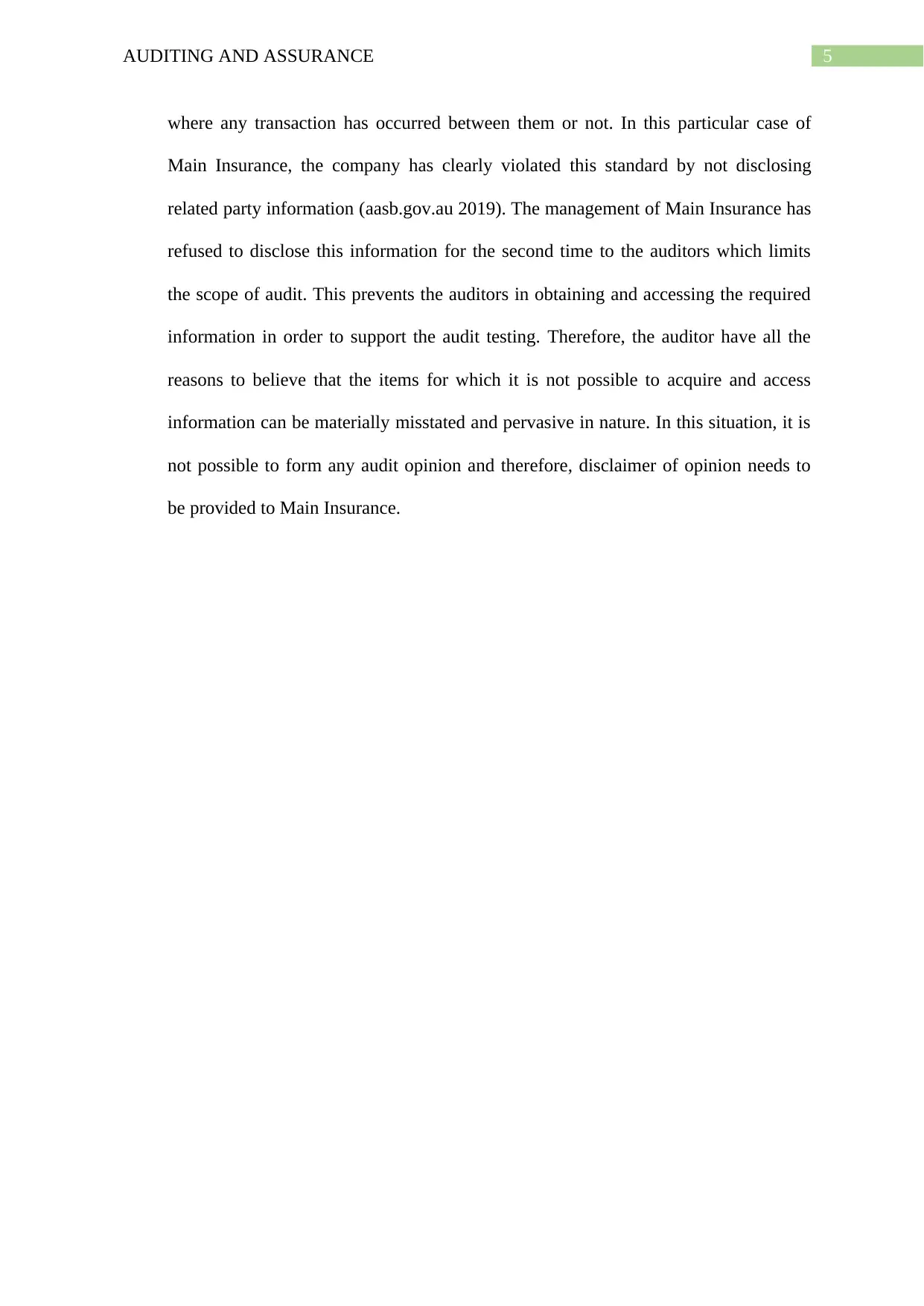
5AUDITING AND ASSURANCE
where any transaction has occurred between them or not. In this particular case of
Main Insurance, the company has clearly violated this standard by not disclosing
related party information (aasb.gov.au 2019). The management of Main Insurance has
refused to disclose this information for the second time to the auditors which limits
the scope of audit. This prevents the auditors in obtaining and accessing the required
information in order to support the audit testing. Therefore, the auditor have all the
reasons to believe that the items for which it is not possible to acquire and access
information can be materially misstated and pervasive in nature. In this situation, it is
not possible to form any audit opinion and therefore, disclaimer of opinion needs to
be provided to Main Insurance.
where any transaction has occurred between them or not. In this particular case of
Main Insurance, the company has clearly violated this standard by not disclosing
related party information (aasb.gov.au 2019). The management of Main Insurance has
refused to disclose this information for the second time to the auditors which limits
the scope of audit. This prevents the auditors in obtaining and accessing the required
information in order to support the audit testing. Therefore, the auditor have all the
reasons to believe that the items for which it is not possible to acquire and access
information can be materially misstated and pervasive in nature. In this situation, it is
not possible to form any audit opinion and therefore, disclaimer of opinion needs to
be provided to Main Insurance.
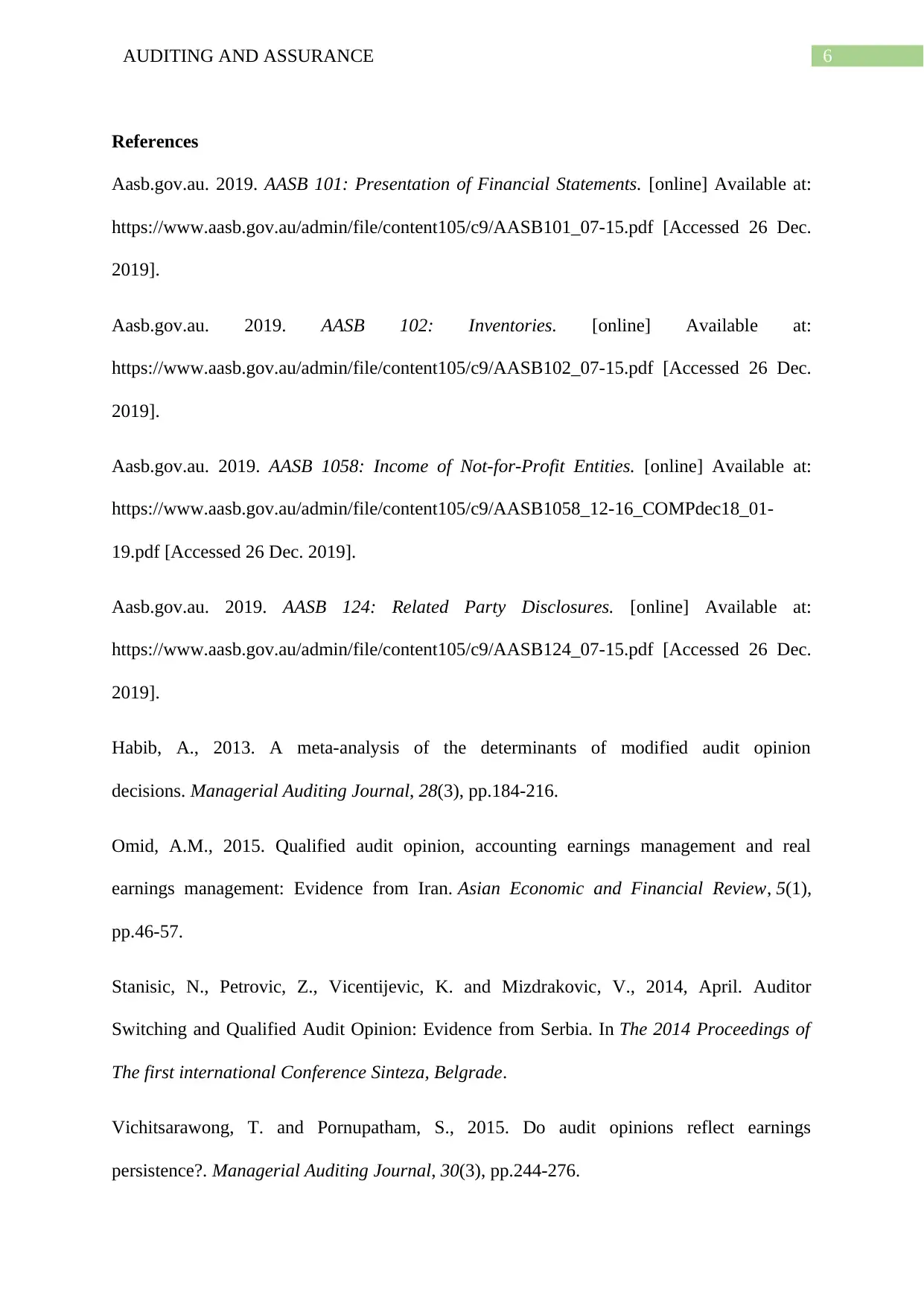
6AUDITING AND ASSURANCE
References
Aasb.gov.au. 2019. AASB 101: Presentation of Financial Statements. [online] Available at:
https://www.aasb.gov.au/admin/file/content105/c9/AASB101_07-15.pdf [Accessed 26 Dec.
2019].
Aasb.gov.au. 2019. AASB 102: Inventories. [online] Available at:
https://www.aasb.gov.au/admin/file/content105/c9/AASB102_07-15.pdf [Accessed 26 Dec.
2019].
Aasb.gov.au. 2019. AASB 1058: Income of Not-for-Profit Entities. [online] Available at:
https://www.aasb.gov.au/admin/file/content105/c9/AASB1058_12-16_COMPdec18_01-
19.pdf [Accessed 26 Dec. 2019].
Aasb.gov.au. 2019. AASB 124: Related Party Disclosures. [online] Available at:
https://www.aasb.gov.au/admin/file/content105/c9/AASB124_07-15.pdf [Accessed 26 Dec.
2019].
Habib, A., 2013. A meta-analysis of the determinants of modified audit opinion
decisions. Managerial Auditing Journal, 28(3), pp.184-216.
Omid, A.M., 2015. Qualified audit opinion, accounting earnings management and real
earnings management: Evidence from Iran. Asian Economic and Financial Review, 5(1),
pp.46-57.
Stanisic, N., Petrovic, Z., Vicentijevic, K. and Mizdrakovic, V., 2014, April. Auditor
Switching and Qualified Audit Opinion: Evidence from Serbia. In The 2014 Proceedings of
The first international Conference Sinteza, Belgrade.
Vichitsarawong, T. and Pornupatham, S., 2015. Do audit opinions reflect earnings
persistence?. Managerial Auditing Journal, 30(3), pp.244-276.
References
Aasb.gov.au. 2019. AASB 101: Presentation of Financial Statements. [online] Available at:
https://www.aasb.gov.au/admin/file/content105/c9/AASB101_07-15.pdf [Accessed 26 Dec.
2019].
Aasb.gov.au. 2019. AASB 102: Inventories. [online] Available at:
https://www.aasb.gov.au/admin/file/content105/c9/AASB102_07-15.pdf [Accessed 26 Dec.
2019].
Aasb.gov.au. 2019. AASB 1058: Income of Not-for-Profit Entities. [online] Available at:
https://www.aasb.gov.au/admin/file/content105/c9/AASB1058_12-16_COMPdec18_01-
19.pdf [Accessed 26 Dec. 2019].
Aasb.gov.au. 2019. AASB 124: Related Party Disclosures. [online] Available at:
https://www.aasb.gov.au/admin/file/content105/c9/AASB124_07-15.pdf [Accessed 26 Dec.
2019].
Habib, A., 2013. A meta-analysis of the determinants of modified audit opinion
decisions. Managerial Auditing Journal, 28(3), pp.184-216.
Omid, A.M., 2015. Qualified audit opinion, accounting earnings management and real
earnings management: Evidence from Iran. Asian Economic and Financial Review, 5(1),
pp.46-57.
Stanisic, N., Petrovic, Z., Vicentijevic, K. and Mizdrakovic, V., 2014, April. Auditor
Switching and Qualified Audit Opinion: Evidence from Serbia. In The 2014 Proceedings of
The first international Conference Sinteza, Belgrade.
Vichitsarawong, T. and Pornupatham, S., 2015. Do audit opinions reflect earnings
persistence?. Managerial Auditing Journal, 30(3), pp.244-276.
1 out of 7
Related Documents
Your All-in-One AI-Powered Toolkit for Academic Success.
+13062052269
info@desklib.com
Available 24*7 on WhatsApp / Email
![[object Object]](/_next/static/media/star-bottom.7253800d.svg)
Unlock your academic potential
© 2024 | Zucol Services PVT LTD | All rights reserved.





